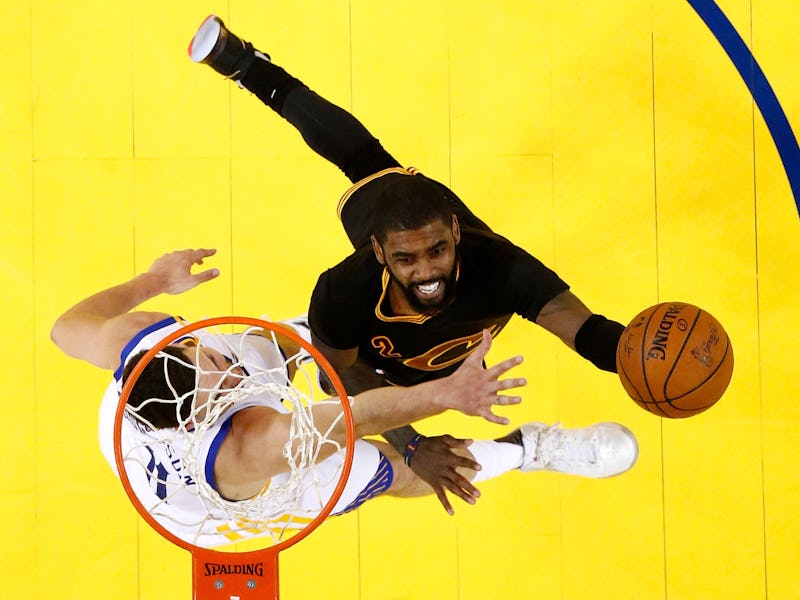Flat Earther Kyrie Irving Has Crossed Science For the Last Time

The celebrity flat Earthers are a troublingly numerous bunch, but for the most part their idiocy has been thought of as laughable, and as such, benign. Case in point: Cleveland Cavalier point guard Kyrie Irving, a man who proudly proclaimed in February that he believed that the Earth was flat. Despite his obvious deficits, Irving is still a highly sought-after NBA player and generally popular guy, and why shouldn’t he be? Until now, his ignorance appeared to affect only himself.
But a recent report by NPR reveals that his ideas have not been as well contained as the science community would hope.
In an interview with NPR, middle school teacher Nick Gurol provided worrying evidence that Irving’s statements have infiltrated the next generation of Americans.
She tells her students — like Nick Gurol, whose middle-schoolers believe the Earth is flat — that, as hard as they try, science teachers aren’t likely to change a student’s misconceptions just by correcting them.
Gurol says his students got the idea of a flat planet from basketball star Kyrie Irving, who said as much on a podcast.
“And immediately I start to panic. How have I failed these kids so badly they think the Earth is flat just because a basketball player says it?”
It’s one thing for Irving to hold beliefs that make him look like an idiot, and another for those beliefs to compromise future generations. Unfortunately, this recent incident shows that Irving’s support of the flat Earth movement is getting in the way of the one thing that can squash it — and other psuedoscientific ideas — altogether: education.
Kyrie Irving, who does not realize that a Flat Earth would not allow him to do this.
Scientists studying the rise and spread of fake news and belief in conspiracy theories have found that it all begins with a lack of education: In a previous interview with Inverse, North Carolina State University psychology professor Anne McLaughlin said that our failure to combat pseudoscience is “mostly on us and the education these adults received.”
Other scientists have pointed out that belief in conspiracy theories tends to increase among people who mistrust authority structures and, as a result, feel a lack of control over their own lives. This suggests that Irving believes that institutional science is not to be trusted — which, fine, “[you] ought to be able to think and say whatever you want,” as Neil DeGrasse Tyson said in response to Irving’s first declarations of flat Eartherism. But to spread that message to kids is to plant a seed of mistrust that has the potential to derail their entire education, which has its foundations in science.
What’s most concerning about Gurol’s Irving-loving middle schoolers is that they might not even be aware that flat Eartherism is a fake, pseudoscientific movement. In the article, NPR noted that Gurol said “he tried reasoning with the students and showed them a video. Nothing worked.” This foreshadows the horrifying possibility that, if celebrities continue to enjoy more credibility than actual scientists, it’s possible that actual science might slip into the fringes, and the ideas at the fringe may become the norm. We’re seeing it already, with Gwyneth Paltrow and her scientifically appalling ideas on GOOP gaining traction among her immense readership. When fake news becomes the most widely accepted news, will it still count as fake?
It’s a scary thought, and fortunately people like Gurol are out there mopping up the mess that Irving and his compatriots are creating among the youth. But Irving — together with B.o.B. and Tila Tequila — arguably hold more sway over American kids (okay, nobody cares about Tila Tequila anymore) than scientists do, so cleanup won’t be easy. Hopefully, the Boston Celtics or the Phoenix Suns, or whichever team ends up dealing with the problematic superstar, will make no excuses for idiocy, Flat Earth Champions be damned.